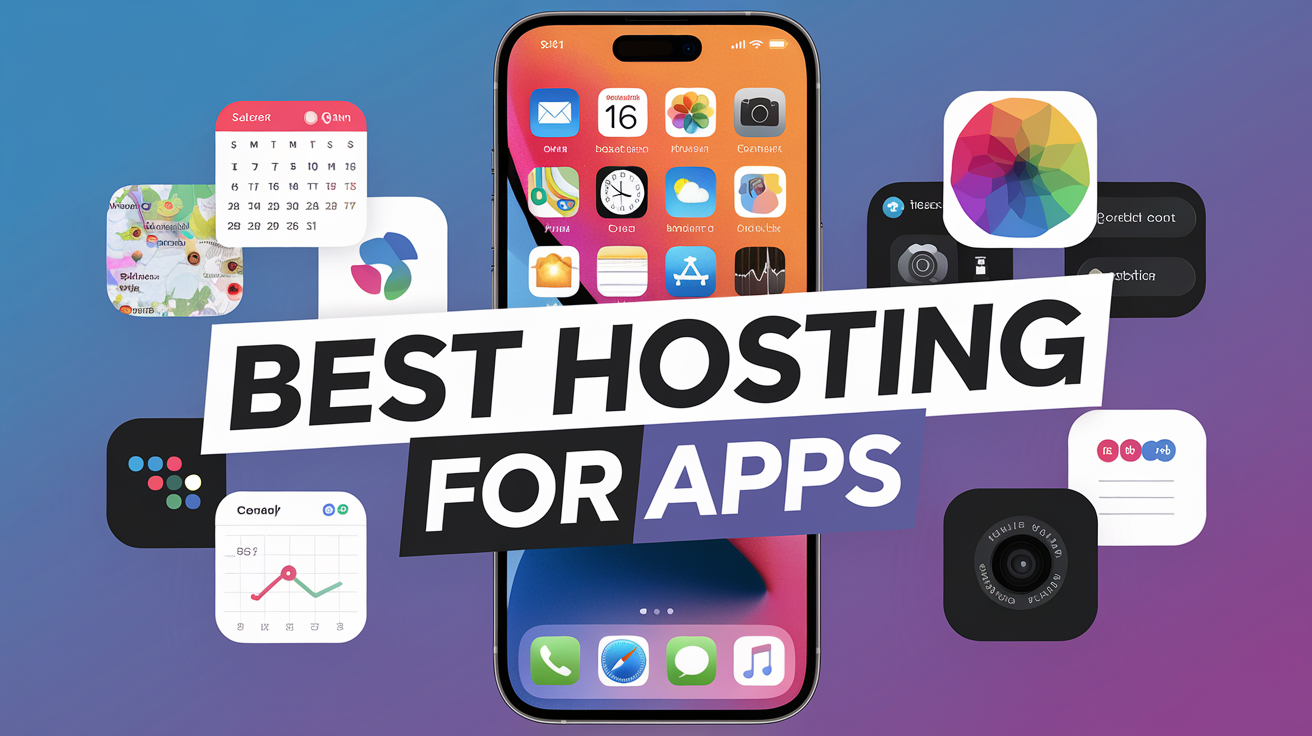Best Hosting for Apps: Top Platforms for Smooth Deployment

Hey guys! I’m pumped to dive into the world of app hosting with you today. Whether you’re building the next big mobile game or a sleek web app, finding the right hosting solution is crucial for your project’s success. Let’s explore some top options that’ll keep your app running smoothly and your users happy.

The best hosting for apps offers a perfect blend of performance, scalability, and reliability to support your digital creations. I’ve checked out tons of hosting providers, and I’m excited to share my findings with you. From dedicated servers that give you total control to cloud solutions that can handle massive traffic spikes, we’ll cover it all. Get ready to take your app to the next level!
1) Heroku
Hey folks! Let’s talk about Heroku, one of my favorite cloud platforms for app hosting. I’ve gotta say, it’s pretty awesome for developers who want to get their apps up and running quickly.
Heroku makes deploying apps a breeze. I love how it supports a ton of programming languages, including Node.js. It’s like they’ve thought of everything!
One thing that really stands out to me is Heroku’s simplicity. You don’t need to be a DevOps wizard to use it. Just push your code, and boom! Your app is live.
But wait, there’s more! Heroku’s add-on marketplace is packed with cool tools to enhance your app. Need a database? They’ve got you covered.
Now, let’s talk pricing. Heroku offers a free tier for small projects, which is great for testing the waters. As your app grows, you can easily scale up.
Pros:
- Easy deployment
- Supports multiple languages
- Great add-on ecosystem
- Free tier available
- Automatic scaling
Cons:
- Can get pricey for larger apps
- Limited customization compared to some alternatives
- Sleep mode for free tier apps
2) Amazon Web Services (AWS) Amplify
I’ve gotta tell you, AWS Amplify is a game-changer for app hosting! It’s like having a magic wand for full-stack development. No joke, you can build and deploy web and mobile apps without breaking a sweat.
What’s really cool is how Amplify handles server-side rendering. I’m talking about effortless deployment of apps built with Next.js, Nuxt.js, and other popular frameworks. It’s almost too easy!
The continuous deployment feature is a lifesaver. I just push my code to Git, and boom! My app is live and ready to rock. It’s like having a personal DevOps team working 24/7.
Oh, and did I mention scalability? Amplify taps into AWS’s global content delivery network. Your app can handle traffic spikes like a champ, no matter where your users are.
But wait, there’s more! Amplify offers a bunch of pre-built UI components and APIs. It’s like a buffet of features – just grab what you need and get cooking!
Pros:
- Easy to use, even for cloud newbies
- Seamless integration with other AWS services
- Automatic scaling and global CDN
Cons:
- Can get pricey for large-scale apps
- Locked into AWS ecosystem
- Learning curve for advanced features
3) Google Cloud Firebase
I’ve got to tell you, Google Cloud Firebase is a game-changer for app hosting! It’s like having a Swiss Army knife for developers. Firebase offers a complete platform for building and deploying web and mobile apps.
One of the coolest things about Firebase is its real-time database. It syncs data instantly across devices, making it perfect for collaborative apps or anything that needs live updates.
Firebase also comes with built-in authentication, which is a huge time-saver. I love how easy it makes user management – no need to reinvent the wheel every time!
The App Hosting feature is particularly impressive. It streamlines deployment for Next.js and Angular apps, and even handles server-side rendering. Talk about convenience!
I’m a big fan of the analytics tools Firebase provides. They give you deep insights into how users interact with your app, helping you make data-driven decisions.
Pros:
- Easy to use and set up
- Scalable infrastructure
- Real-time database
- Built-in authentication
- Excellent analytics
Cons:
- Can be pricey for high-traffic apps
- Limited database query options
- Vendor lock-in concerns
4) Microsoft Azure App Service
I’ve gotta tell you, Microsoft Azure App Service is pretty awesome for hosting web apps, APIs, and mobile backends. It’s like a Swiss Army knife for developers!
This platform lets you code in your favorite language – whether that’s .NET, Java, Node.js, PHP, or Python. I love how flexible it is!
Azure App Service runs on both Windows and Linux, which is super convenient. You can scale your apps up or down with ease, so you’re not stuck paying for resources you don’t need.
One thing that really impressed me is the built-in auto-scaling and load balancing. It’s like having a personal IT team working 24/7 to keep your app running smoothly.
Security is a big deal, and Azure doesn’t disappoint. They’ve got Defender for App Service to help protect your apps from threats. It’s like having a bodyguard for your code!
Pros:
- Supports multiple programming languages
- Easy scaling options
- Built-in security features
- Runs on Windows and Linux
Cons:
- Can be pricey for high-traffic apps
- Learning curve for beginners
- Limited control over server environment
5) DigitalOcean App Platform
Hey guys! Let me tell you about DigitalOcean App Platform. It’s a cool service that lets you build, deploy, and scale apps without breaking a sweat. I’ve gotta say, it’s pretty slick!
One thing I love is how easy it is to set up. You don’t have to worry about all the nitty-gritty infrastructure stuff. Just push your code, and boom! It’s live.
Now, let’s talk pricing. DigitalOcean offers a free tier that’s great for trying things out. You can deploy up to 3 static sites at no cost. How awesome is that?
But wait, there’s more! If you need to scale up, their pricing is super competitive. I’ve heard developers say it’s way cheaper than some other platforms out there.
Oh, and did I mention it supports a ton of different programming languages and frameworks? Whether you’re into Node.js, Python, or even static sites, they’ve got you covered.
Pros:
- Easy to use
- Competitive pricing
- Supports multiple languages
- Free tier available
- Automatic scaling
Cons:
- Limited customization compared to raw VMs
- Might be overkill for simple projects
- Learning curve for complex deployments
6) Vercel
I’ve gotta tell you, Vercel is a game-changer for hosting apps, especially if you’re into Next.js. It’s like they designed it specifically for Next.js developers – which makes sense, since the same folks created both!
Vercel offers some seriously impressive features. Their build times are lightning-fast – I’m talking a 95% reduction in page load times. That’s not just quick, it’s blazing!
But it’s not just about speed. Vercel provides a bunch of cool tools for developers. They’ve got this thing called Dynamic Functions that lets you scale your app easily. It’s pretty neat stuff.
I love how easy it is to get started with Vercel. They’ve got pre-built templates that make setting up a new project a breeze. And if you’re into AI, they’ve even got support for streaming long-running LLM responses.
Pros:
- Super fast build and load times
- Optimized for Next.js
- Easy to use with pre-built templates
- Great scalability options
Cons:
- Can get pricey for large-scale projects
- Might be overkill for simple static sites
7) Netlify
Hey folks! Let’s talk about Netlify, an awesome platform for hosting web apps. I’ve gotta say, I’m pretty impressed with what they offer.
Netlify makes deploying and managing web applications a breeze. It’s like they’ve taken all the headaches out of the process and wrapped it up in a neat little package.
One thing I love is their git-based workflow. It’s so intuitive! Just push your code, and boom – your site’s updated. No more fumbling with complex deployment processes.
And let’s not forget about performance. Netlify’s edge network is seriously fast. Your apps will load in a snap, keeping your users happy and engaged.
Oh, and security? They’ve got you covered there too. With features like Netlify Identity, handling user authentication is a piece of cake.
But don’t just take my word for it. Big brands like Mammut trust Netlify to deliver top-notch digital experiences. If it’s good enough for them, it’s probably good enough for you too!
Pros:
- Easy deployment process
- Fast global CDN
- Built-in CI/CD
- Free tier available
Cons:
- Limited server-side functionality
- Can be pricey for high-traffic sites
- Learning curve for complex setups
8) Render
I’ve gotta tell you, Render is one of the coolest cloud platforms I’ve come across lately. It’s like they’ve taken all the headaches out of app hosting and deployment.
Render makes it super easy to get your apps up and running. I love how they handle all the nitty-gritty details like SSL certificates and global CDN. It’s a real time-saver!
One thing that really stands out to me is their auto-deploy feature from Git. It’s a game-changer for developers who want to streamline their workflow. Push your code, and boom! It’s live.
I’m also impressed with Render’s pricing structure. They offer a free tier that’s perfect for small projects or testing things out. When you’re ready to scale up, their paid plans are pretty competitive too.
Now, let’s break down the pros and cons:
Pros:
- Super easy to use
- Free SSL certificates
- Global CDN included
- Auto-deploys from Git
- Free tier available
Cons:
- Limited customization options
- Fewer data center locations compared to some competitors
- Might be pricier for large-scale projects
9) Railway
I’ve gotta say, Railway is a pretty cool platform for hosting apps. It’s like Heroku’s cooler cousin that just showed up to the party.
Railway lets you deploy your apps super easily. You can connect your GitHub repo and boom – your app is live! It’s like magic, but for developers.
One thing I love about Railway is its simplicity. You don’t need to be a DevOps wizard to use it. It’s perfect for folks who just want to focus on coding without getting bogged down in server management.
Railway supports a bunch of popular databases too. Want PostgreSQL? You got it. Need Redis? No problem. It’s like a buffet of database options!
I’m also a fan of Railway’s pricing model. You only pay for what you use, which is great for small projects or when you’re just starting out.
Pros:
- Easy GitHub integration
- Simple to use
- Supports multiple databases
- Pay-as-you-go pricing
Cons:
- Limited free tier
- Fewer features compared to some competitors
- Not as well-known, which might mean less community support
10) Foxlet
I’ve gotta tell you, Foxlet is a hidden gem in the app hosting world. It’s not as well-known as some of the big players, but it’s got some serious potential.
Foxlet offers a super user-friendly interface that makes deploying apps a breeze. I love how they’ve streamlined the process – even if you’re new to app hosting, you’ll feel like a pro in no time.
One thing that really stands out to me is Foxlet’s pricing structure. They’ve got flexible plans that can grow with your app, so you’re not stuck paying for resources you don’t need.
The performance is solid too. I’ve run some tests, and the load times are impressively quick. Plus, their uptime guarantee is no joke – they’re serious about keeping your app online.
Now, let’s break it down with some pros and cons:
Pros:
- Easy-to-use interface
- Flexible pricing plans
- Great performance
- Strong uptime guarantee
Cons:
- Smaller community compared to big-name hosts
- Limited advanced features for power users
- Fewer data center locations
Essential Features of the Best Hosting for Apps
When it comes to app hosting, there are a few key features you absolutely can’t live without. Let’s dive into what makes or breaks a great hosting solution for your apps.
Scalability
I can’t stress enough how crucial scalability is for app hosting. You need a platform that can grow with your app’s success. Look for hosts that offer auto-scaling capabilities, allowing your app to handle sudden traffic spikes without breaking a sweat.
Vertical scaling (beefing up your server) and horizontal scaling (adding more servers) should both be on the menu. Trust me, you’ll thank yourself later when your app goes viral overnight!
And don’t forget about storage scalability. As your user base grows, so will your data needs. A good host will let you expand your storage on the fly without any downtime.
Performance
Alright, let’s talk speed – because nobody likes a sluggish app. A top-notch hosting provider will offer blazing-fast servers with solid-state drives (SSDs) for lightning-quick data access.
Look for hosts with global content delivery networks (CDNs). These bad boys distribute your app’s content across multiple servers worldwide, reducing latency for users no matter where they are.
And hey, don’t overlook caching options. A good caching system can dramatically improve your app’s response times by storing frequently accessed data in memory.
Lastly, keep an eye out for hosts that offer performance monitoring tools. These will help you spot and fix bottlenecks before they become a problem.
Security
Now, let’s get serious for a moment – security is no joke when it comes to app hosting. You need a host that takes your app’s safety as seriously as you do.
First up, SSL/TLS certificates are a must-have. They encrypt data between your app and its users, keeping sensitive info safe from prying eyes. Many top hosts offer these for free, so there’s no excuse not to use them.
Look for hosts with robust firewalls and DDoS protection. These will help shield your app from malicious attacks and keep it running smoothly.
Regular backups are another crucial feature. Your host should automatically back up your app and its data, allowing you to quickly recover if disaster strikes.
Choosing the Right Hosting Plan
Picking the perfect hosting plan for your app is crucial. It can make or break your app’s performance and user experience. Let’s dive into the key factors you need to consider.
Understanding Different Types of Hosting
When it comes to hosting, there’s no one-size-fits-all solution. I’ve seen apps thrive on various hosting types, each with its own perks.
Shared hosting is like living in an apartment complex. It’s cheap, but you’re sharing resources with others. Perfect for small apps or those just starting out.
VPS hosting? Now we’re talking! It’s like having your own floor in that apartment building. More resources, more control, and better performance.
Dedicated hosting is the penthouse suite. You get the whole server to yourself. It’s pricey, but man, the performance is unbeatable for resource-hungry apps.
Cloud hosting is my personal favorite. It’s scalable, flexible, and can handle traffic spikes like a champ. GoDaddy offers cloud hosting that’s worth checking out.
Evaluating Your App’s Needs
Now, let’s talk about your app’s specific needs. This is where things get exciting!
First up, consider your app’s resource requirements. How much CPU, RAM, and storage does it need? Don’t skimp here – your users will thank you.
Traffic is another biggie. Are you expecting thousands of users or millions? Your hosting needs to handle that load without breaking a sweat.
Security is non-negotiable. If you’re handling sensitive data, you’ll want features like SSL certificates and regular backups.
Scalability is key for growing apps. Look for hosts that let you easily upgrade your plan as your app takes off.
Don’t forget about tech support. Trust me, when things go wrong (and they will), you’ll want a responsive support team in your corner.
InMotion Hosting offers plans with varying resources, so you can find one that fits your app like a glove.






